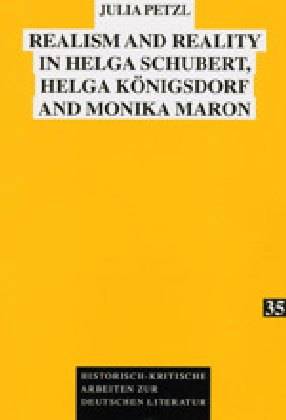
- Afhalen na 1 uur in een winkel met voorraad
- Gratis thuislevering in België vanaf € 30
- Ruim aanbod met 7 miljoen producten
- Afhalen na 1 uur in een winkel met voorraad
- Gratis thuislevering in België vanaf € 30
- Ruim aanbod met 7 miljoen producten
Realism and Reality in Helga Schubert, Helga Koenigsdorf and Monika Maron
Dissertationsschrift
Julia Petzl
€ 58,95
+ 117 punten
Omschrijving
This book analyses the neglected short prose of Helga Schubert, Helga Königsdorf and Monika Maron, concentrating on their pre-Wende writing. In addition to in-depth analysis of themes, the use and non-use of realism is examined. Each author is preoccupied with a stagnating society, but communicates differently. Schubert is covertly political, limiting herself to snapshots of life in the GDR. Königsdorf diagnosed society's illnesses as a distortion of values linked to industrialization and Maron consciously attacks the regime in her work, exposing the corruption of the State. By focussing on women, this study furthers the establishment of female writers in mainstream academic discourse, and reflects not just the women's political but also their philosophical and social approaches to life. Analysis of their short fiction provides a more complete overview of the authors' development, thereby complementing studies, of their novels.
Specificaties
Betrokkenen
- Auteur(s):
- Uitgeverij:
Inhoud
- Aantal bladzijden:
- 180
- Taal:
- Engels
- Reeks:
- Reeksnummer:
- nr. 35
Eigenschappen
- Productcode (EAN):
- 9783631501016
- Verschijningsdatum:
- 12/08/2003
- Uitvoering:
- Paperback
- Formaat:
- Trade paperback (VS)
- Afmetingen:
- 148 mm x 210 mm
- Gewicht:
- 249 g

Alleen bij Standaard Boekhandel
+ 117 punten op je klantenkaart van Standaard Boekhandel
Beoordelingen
We publiceren alleen reviews die voldoen aan de voorwaarden voor reviews. Bekijk onze voorwaarden voor reviews.










